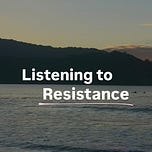Do you ever feel stuck in resistance that seemed to come out of nowhere?
One week you may feel deeply connected and inspired only for another week to follow where you suddenly feel avoidant, resentful, or chaotically caught in an unshakeable brain fog?
Two weeks ago, I traveled to Hawaii with the Freedom Movement staff. I’m not exaggerating when I say the trip was life-changing for me. We enjoyed rest and played as a team and spent two days doing personal story work training with Cathy Loerzel and Christy Bauman.
I found myself caught at the intersection of many divine details and lessons that led to a profound deliverance in my personal life on this trip—an experience I’m still unpacking.
Normally, I can articulate the lessons I learn from experiences like this quickly, turning them into something that could encourage or educate others with.
But this trip was so sacred and deeply personal that I felt very resistant to sharing about it at all when I came home. Not only that, I felt suddenly protective of my privacy and a bit overwhelmed by the demands of life and work upon re-entry.
My friend Kaitlyn, our therapist on staff at Freedom Movement, said something on our trip that stuck with me: “Listen to your resistance. Remain curious and connected to the places of your heart that are causing tension. Resistance often has a lot to say.”
Historically, resistance isn’t something I’ve welcomed freely. I would either bulldoze through it, ignore it, or let it control me. I now know to welcome resistance to the table to speak freely.
So, instead of sharing the details of my trip, I opened discussion about this tension I was navigating in my Instagram stories—how I was wrestling with what to share and what to keep just for me. The response was overwhelming. So many of you said, “Yes. I feel this too.”
Listening to resistance is the work of attunement – engaging emotional tension with open curiosity and attention that asks questions like: “Why is this resistance here? What is this resistance saying? What is this resistance protecting?”
We don’t heal or change in comfort zones – tension is required for the work of transformation. Sometimes the resistance is naming a boundary that needs to remain protected. Other times it’s revealing a boundary that could be challenged and moved. In both cases, resistance is honored.
An analogy has been rumbling around in my mind as I try to deepen my understanding of attunement and the role resistance plays in embodying this practice—not just for connection with ourselves, but as leaders who long to create deeper connections with others. I’ll share the analogy with you at the end, but first, some context and a few stories.
What is Attunement?
Attunement is the ability to discern, understand, and respond to another person’s emotions, thoughts, and experiences. But before we can attune to the experiences of others, we must first become aware of our inner emotional world—without fear or self-condemnation.
Our stories shape how we perceive and respond to emotions experienced by us and others. Without the truth of our stories and clear understanding of the ways the enemy has exploited our pain to bind us to self-protection, we will not live in the fullness of connection God designed us for.
Attunement at the Altar
A few years ago, I was standing at the altar of our church after service. As a member of the prayer team, you can often find me lingering at the foot of the stage, available for anyone who needs prayer. A new mother who had been attending our church for some time approached me with her two-week-old baby in a stroller.
I greeted her with a smile, excited to see her and meet her little one. She mirrored my enthusiasm, her face lighting up.
“How are you?” I asked.
She glanced down at her sleeping baby, her smile held a mix of delight, exhaustion, and sorrow. “I’m good!” she said.
I asked her what her delivery was like.
“It was really hard,” she admitted. “After thirteen hours of labor, I was forced into a C-section. The anesthesia didn’t fully work during the surgery.”
Her lips and chin slightly trembled as she spoke. Then suddenly, as if zipping a mask over her sorrow, she took a deep breath and added with a smile, “But my dad keeps reminding me that the important thing is that we are both alive and well.”
The work of attunement is listening—not just to the words spoken, but to the emotion and body cues that reveal what is left unsaid, yet desperately wants to be felt, heard, and held truthfully. It was clear she was carrying trauma from her birth experience. I was curious about how it had affected her but no one can force their way into the deep waters of someone’s heart—they have to be invited in.
So I gently asked, “I hear the truth that you’re alive and healthy, and I’m so grateful for that. But it sounds like your delivery was terrifying. What was it like for you?”
It was as if a dam broke. She poured out the truth of her experience, desperate for someone to hold it with her.
“I tried so hard to keep it together. The pain was unbearable. The room was so chaotic—it felt like it was closing in on me. I felt everything during the C-section. The doctor was annoyed with me and asked my husband if I had anxiety because I was overreacting.”
She was furious. Terrified.
As she paused to take a breath, I stayed with her.
“That sounds horrific,” I said. “Tell me more about the pain you felt during the procedure.”
“Yes, it was horrible. It felt like I was being torn in two or burned alive.” Her voice cracked, and she broke down in sobs. “I keep waking up in the middle of the night with unbearable anxiety. I don’t want to. In my mind, I know we’re okay—we survived. But I can’t shake this overpowering fear.”
In the moments that followed, I simply stayed present. I validated how terrifying her experience was. I listened—without trying to fix her. I asked how I could support her. And then, after sharing tears together, we prayed—inviting the God of peace to invade, to carry her terror, disappointment, and anger so she could begin to access rest.
The entire conversation lasted maybe twenty minutes. But before she walked away, she said, “I needed that. Thank you. I feel settled just knowing someone else knows what that was like for me.”
The following week, she approached me after church again. She told me that after our short interaction, she had been able to sleep through the night and that the anxiety had started to lift. She had been more honest with her family about how their well-meaning encouragement felt dismissive. She had begun asking for what she needed. She had even hired a therapist to help her continue processing her traumatic birth experience.
Praise God.
Instead of trying to swallow this resistance that was causing such turmoil within her. She invited God and trusted people into the reality of pain. Her resistance named key needs and support and, ultimately, led her back to safe connection with herself, God, and others.
What Gets in the Way of Attunement?
This interaction would have looked very different if I had been comfortable with emotions like disappointment, horror, confusion, or rage.
Often, especially in Christian circles, we want to make these emotions disappear as quickly as possible. We try to explain them away, pray them away, or avoid them altogether in favor of keeping things joyful and light.
God is good all the time, and all the time God is good – right?
Yes, He is always good. But our circumstances aren’t always. God doesn’t ask us to live in denial of the sorrow of our experience but to come to Him with honesty.
If I had been afraid of these emotions, I would have accepted her words at face value, without deeper curiosity. I would have offered a surface-level prayer for her anxiety, and she would have still felt unseen when she left—still lost in the chaos of her inner emotional world.
If I am blind to or in bondage to my own emotional reality, I cannot freely and empathetically hold the complex emotions of others with wisdom. I won’t even be able to hear the emotional tone beneath their words. Without attunement, connection becomes shallow and hollow.
I have to be comfortable enough to access my own pain in order to enter the depths of someone else’s.
This is why trauma-informed, Spirit-led, and Biblical work around our stories is so crucial. We want to be freed from what keeps us from loving people boldly, freely, and honestly.
Tuning Instruments
Like many others, at the start of every year, I ask God to give me a word as a theme. This year, I initially had four words to choose from—humility, honor, presence, and curiosity. As I mapped them out to find patterns and connections, one word kept surfacing, tying them all together: listen.
Without ears to hear, I can’t live in a posture of humility and honor. Without the practice of listening intentionally, presence and curiosity are limited.
So naturally, I’ve been paying attention to things related to this theme of listening.
Maybe this connection was obvious to you from the moment you read the word attunement, but for me, the light bulb just went off last week—attunement in relationships is like tuning an instrument.
When my husband tunes his guitar, he begins with one string. He listens closely, twisting the knobs until the tone is correct. Often, he’ll use an electric tuner to ensure each string is perfectly in pitch, but having been a musician for years, he also knows the correct sound of, say, a G note. Once one string is in tune, the whole instrument can be brought into alignment.
Resistance plays a crucial role in tuning an instrument because tension—or the resistance within the strings, air, or materials of the instrument—determines the pitch. If a string is too loose (not enough resistance), the note is flat. If it’s too tight (too much resistance), the note is sharp. Tuning is the process of adjusting this resistance until the string vibrates at the correct frequency, producing a pure, harmonious sound.
Using my experience last week as an example—when I tried to share about my trip on social media—I would pick up my phone to write, and it was as if a guitar had been strummed and two of the strings were a little sharp. There was too much resistance to keep strumming and pretend the instrument was in tune. If we ignore or force past resistance, we create dissonance. But when we acknowledge and adjust to it, we find harmony and true connection.
Attuned adjustment requires a few things:
1. Pause the Noise
What can be paused in your life? You have to stop playing the instrument in order to tune it. Resistance cannot be engaged well without reflection. Silence, solitude, simplicity, and stillness create the space necessary to listen.
2. Identify One Note
What string on the guitar of your life seems out of tune? What is carrying too much or not enough resistance? Instead of trying to fix everything at once, choose one area of your life to begin tuning. Specificity is key in the work of attunement.
3. Listen and Adjust
Where is the dissonance? Pay attention to your body’s sensations, thoughts, and behaviors. You may need the presence of another person to help you decipher the correct tone. Often, we can’t hear things correctly on our own—we need God and trusted, safe people to listen with us and help us “find the note.”
4. Align the Strings
What other notes need adjustment? Once one string is in tune, we can begin adjusting the others. If the instrument has been tuned frequently, these are small adjustments. But if the strings of our lives have been played for years without attunement, the adjustments may require big changes—changes that take time, careful care, and support.
5. Play the Song
What song am I singing in this season? When our lives are in tune, we can play the song of our season freely. Whether it’s a slow, somber melody or an upbeat, energetic one, we can live in alignment.
My hope is that as you put this into practice, you will find yourself playing to the tune of God’s love rather than the dissonance of fear.
For Eternity & Until,
Tori
If you are interested in taking the first step toward greater curiosity, deeper connection, and freedom in your life join us for Freedom Academy Online!
Freedom Academy Online: Level 1
Friday, April 4 - Sunday, April 6, 2025
Freedom Academy online is a comprehensive course that combines personal development with leadership training. Normally this training is in-person but has been adapted to fit an online format with breakout groups and live interactive training.
If you’re a parent, pastor, trusted friend, or mentor, the personalized training and resources you receive will equip you to become the loving, spiritually anchored support your community needs.













Share this post